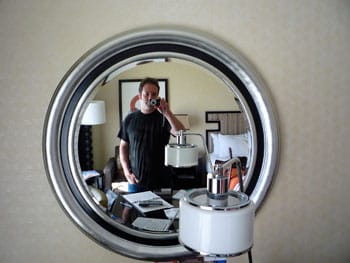Frank Portman
Frank Portman was once better known as Dr. Frank, frontman of the seminal Bay Area punk band The Mr. T Experience. Now he’s building a reputation as an author. His latest novel, “Andromeda Klein,” is due out on Aug. 25.

Interview contributed by Jay Hathaway.
TMN: What do you put down for “occupation” when you’re filling out forms these days?
FP: You know, I had to deal with this recently, because I just had a visit to the U.K., and on their landing cards they make you specify an occupation. A lot of previous times going over to England, I had to disguise everything about what I did, because if you say “musician,” they assume you’re taking jobs away from other musicians over there, so you make up something else. I did put “writer” in it this time. I’ve never felt that comfortable saying that when I only had one book, because it seems like if I never manage to finish another one, then it seemed a little bit presumptuous to go ahead and say “writer,” but now I feel two is pretty good. Two, you can say you’re a writer. At least, that’s my personal code.
TMN: What is your favorite object in your office?
FP: This large fiberglass hand is quite famous amongst a small number of people because it was used as a prop for the photo on the cover of the Revenge Is Sweet and So Are You album. I think its message is: stop.

TMN: What’s something you’re not good at but wish you were?
FP: To sing beautifully, to be good with money, and to be able to charm monkeys.
TMN: Was it harder to write a teenage girl [in Andromeda Klein] than it was to write a teenage guy [in King Dork]?
FP: There’s a little bit of a political angle to a guy writing a book from a female point of view. You wonder what people will make of it. As far as the actual words on the page and the actual characterization, I didn’t find that hard at all. Some people could say, “It’s not a successful girl,” maybe, but I actually think it is. Human psychology and experience is a massively enormous complex thing, and the crude division of sex doesn’t even touch the surface of it. It’s a lot harder to engineer the thoughts of an introvert, per se, than the difference between a female introvert and a male introvert.
TMN: How much did you know about the occult and tarot cards when you started Andromeda Klein?
FP: It’s like a lot of things, where you think you know a lot about it before you really have to put yourself on the line and present it. It mostly involved a lot of reading of a lot of very crazy books. The contents of my library are radically different, and very, very, very much weirder than they were two years ago. In King Dork, I thought, “I know something about the experience of being a socially unsuccessful high school dork type,” but that’s a common theme in movies and books, and certainly teen novels. I wanted to take this stock thing and present it in a way that’s a little more resonant and a little more interesting, not just Napoleon Dynamite Plus. A similar thing to the high school nerd is a teen witch. So I just thought, “What would a more interesting version of that be?” I wanted to make sure all of the stuff she was involved with was real stuff. I think that’s the main failing of a lot of novels and movies about the occult. It’s someone’s idea of what that material maybe ought to look like. I took it pretty seriously, figuring out what a person like her would be doing.
TMN: Does being a doctor matter as much in the literary world as it does in rock and roll?
FP: I don’t have an advanced degree. I have a regular old bachelor’s degree. People just think that because of my curmudgeonly and pedantic manner. I graduated from college and had a hard time finding a job, so I decided to be a pretend rock star, and that was the way my life went. But no, I think that there are annoying, pretentious writers out there for sure, like there are in any endeavor. Music has its share of people with that sort of self-regard. Most writers I know are pretty down to earth. There’s a shared terror of the world and how it is going to pounce on and crucify your writing every time you put it out. There are some exceptions, and some writers who think they’re God, but there’s nothing like writing a novel to teach you humility.
TMN: Who is your archnemesis?
FP: I have thought long and hard on this one, in hopes of arriving at an answer that would not be career suicide. And that answer is my cat, Matilda, who appears to spend all of her waking hours—admittedly a very short span of time—plotting my destruction.
